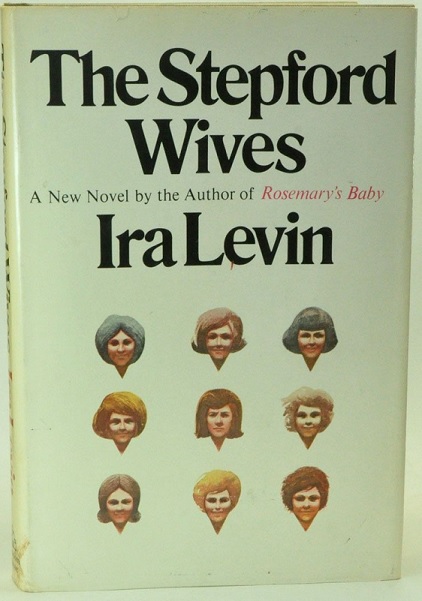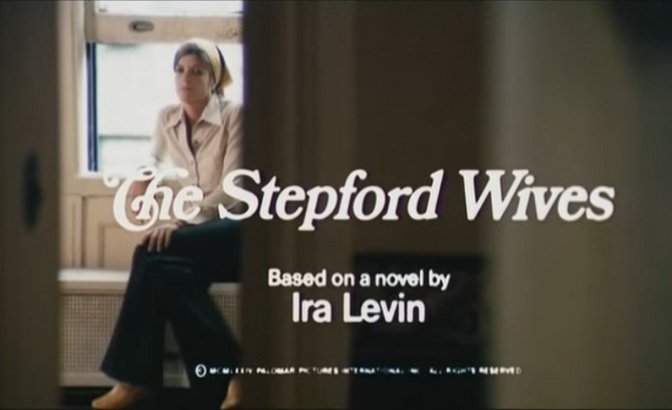PRODUCER HAD LIKED 'SISTERS', BUT SCREENWRITER WILLIAM GOLDMAN SAID NO
 Brian De Palma has cited the dream sequence in Roman Polanski's adaptation of Ira Levin's Rosemary's Baby as the key inspiration for the exposition sequence in Sisters. One can imagine De Palma's enthusiasm when, soon after, a producer (Edgar J. Sherick) let him read the screenplay for another Levin adaptation, The Stepford Wives, with hopes of De Palma directing. The screenplay was written by William Goldman, who, sadly, passed away last week at 87. For whatever reason, Goldman, according to Sherick, did not want De Palma to direct the picture, and threatened to leave the project if De Palma was hired. Somehow the film, released in 1975, ended up starring Katharine Ross, who had played the "Terrific-Looking Girl" in De Palma's first Hollywood foray, Get To Know Your Rabbit. British director Bryan Forbes directed the movie as we know it today, but it turns out that Forbes changed Goldman's "much more horrific" ending. Read the whole story below in this transcript from the film's 2001 DVD special feature "The Stepford Life"...
Brian De Palma has cited the dream sequence in Roman Polanski's adaptation of Ira Levin's Rosemary's Baby as the key inspiration for the exposition sequence in Sisters. One can imagine De Palma's enthusiasm when, soon after, a producer (Edgar J. Sherick) let him read the screenplay for another Levin adaptation, The Stepford Wives, with hopes of De Palma directing. The screenplay was written by William Goldman, who, sadly, passed away last week at 87. For whatever reason, Goldman, according to Sherick, did not want De Palma to direct the picture, and threatened to leave the project if De Palma was hired. Somehow the film, released in 1975, ended up starring Katharine Ross, who had played the "Terrific-Looking Girl" in De Palma's first Hollywood foray, Get To Know Your Rabbit. British director Bryan Forbes directed the movie as we know it today, but it turns out that Forbes changed Goldman's "much more horrific" ending. Read the whole story below in this transcript from the film's 2001 DVD special feature "The Stepford Life"...Peter Masterson (who played Walter) -- A friend of mine at the time, and still is, William Goldman, was writing the screenplay. And I had been aware of the work he'd been doing on it, because he was interviewing Betty Friedan and all the feminists of the time. That was a hotbed of feminism was the '70s, and the early '70s. So Bill set out to make this a feminist diatribe, basically. That was his goal.Bryan Forbes: There was a draft, yes, by William Goldman, which I thought needed work on it, and so did Ed Sherick. He was, um, charming. He became, perhaps, progressively less charming. I don't think he likes directors, and he particularly doesn't like English directors, I don't think.
Edgar J. Sherick: Before Bryan Forbes came on... what the hell was the guy's name... Brian De Palma. I gave-- I liked Brian De Palma, because he'd done a picture called Sisters-- and I gave him the script to read it. He said to me, "This is my ticket to the big time." He loved it. So I said to Goldman, "I'd like to hire Brian De Palma." He said to me, "If you hire Brian De Palma, I don't want anything ever to do with the picture again!"
Bryan Forbes: I mean, it was a very good script, a very good draft that he'd done. But I felt it was capable of improvement...
Edgar J. Sherick: Bryan Forbes did some work on the script, much to Goldman's chagrin.
Peter Masterson: Bill and I were playing tennis one day, and he came and he said, "I just delivered the rewrite to Forbes." That afternoon, I had a meeting with Bryan, about something else, and he didn't know anything about it. He said, "Well, Goldman never turned in the script." I thought, wait a minute, Bill just told me he'd just turned in the script. What's going on here? And he says, "I'm gonna have to rewrite it myself."
Bryan Forbes: And finally I did a final shooting script myself. So there are lots of sacred and profane bits of me in that film, which are not Goldman.
Peter Masterson: And he was angry. he was a celebrated screenwriter, Academy Award winner as a screenwriter, and he didn't want somebody rewriting his material.
Bryan Forbes: He wrote a much more horrific ending, which I thought ran counter to the rest of the movie. So the ending was very greatly altered by me.
Edgar J. Sherick: He wanted to do something with the opening, which he did, and we actually shot Bryan Forbes' opening.
Bryan Forbes: I said when they leave the New York apartment, just before the credits start, the little girl, the daughter, says, "Daddy, I've just seen a man carrying a naked lady." And the father says, "Yes, that's why we're moving to Stepford." In retrospect, with hindsight, that has double meaning.
Peter Masterson: I remember one time, a little confrontation Bryan and I had on the set. It was a line I was supposed to say, "I was talking to some of the chaps on the train this morning." I said, "You know, I wouldn't say 'chaps'. Americans don't say that. That's an English thing." He said, "Well, what's wrong with saying it?" And I said, "Well, you wanna change it to the Twickenham Wives, it'd be all right.
Bryan Forbes: Well, we had a great deal of trouble casting the movie for various reasons. I suppose I must have interviewed 25 leading ladies, and for one reason or another, a lot of them fell by the wayside.
Peter Masterson: Bill Goldman's ideal model for it was Mary Tyler Moore and Valerie Harper.
Bryan Forbes: I cast Diane Keaton. Had a great day with her, went over the script with her, how we'd do it, how we'd play it, etc. And she went off at 5 o'clock from my office, happy as a lark, as far as I was concerned. And the following morning about half past nine, she rang me and said, "I'm sorry, I'm not doing the movie." And I said, "Gosh, what happened between 5:30 and 9 o'clock this morning?" She said, "Well, I gave the script to my analyst, and he got very bad vibes from it, so I can't do it." I then tried to get Jean Seberg, but sadly she was close to doing what she did, because she committed suicide. And then another one was not allowed to do it for political reasons, because the money was coming from a big corporate company. And finally, and happily, I ended up with Katharine Ross.
[LATER in the doc...]
Bryan Forbes: William Goldman-- he wrote nasty things, and said that the lack of success of the film in America was entirely due to my casting Nanette [Newman, Forbes' wife], which I thought not only was a total exaggeration, because Nanette wasn't playing the lead anyway, and grossly rude, I thought... offensive.
Peter Masterson: And it also led to costuming the picture in a different way. The intent was that all the women in Stepford were Playboy bunnies. And because Nanette wouldn't have looked good in a Playboy bunny outfit or something like that, they wanted long dresses, which kind of toned down the whole thing.
Paula Prentiss: And I thought when he dressed us in the long dresses at the end, in the shopping market, that was great. Because it was kind of like Victorian dressing, which was the point-- you know, the point is women are still living in the Victorian Age, in a way.
Bryan Forbes: I don't mind what people say about me, but I'm like a tiger if anybody attacks my wife.
Peter Masterson: Yes, he was angry, and I don't think they spoke again. I could be wrong about that, but that's my guess.
[LATER in the doc...]
Peter Masterson: Bryan Forbes didn't know that I knew Bill Goldman. When we would shoot a scene, I would call Bill and say, "This is the scene. I can't remember what your original intent was." And he would tell me, "Well, you missed... if you could talk him into getting this back into the scene, try to do that. Bryan didn't know we were talking, and I couldn't tell him to put back stuff that was exactly like Bill had it, because he would suspect something, I think.

IN 2012, DE PALMA ALMOST DIRECTED A VERSION OF GOLDMAN'S 'HEAT'
De Palma had a more recent brush with a William Goldman screenplay in 2012, when Jason Statham wanted De Palma to direct him in a new version of Goldman's Heat. A 1986 film adaptation of Goldman's novel, for which he also wrote the screenplay, starred Burt Reynolds. The troubled production went through six directors and many rewrites. It was said that the 2012 version, which again had Goldman attached as screenwriter, went back to Goldman's original version of the screenplay. A press release in 2012 described the film this way:
This tightly-wound, fun action-thriller, tells the story of a tough recovering gambling addict (Statham) who makes his living providing protection in the rough edges of the gambling world. Statham’s character refuses to resort to gunplay, strictly using hand and edged weapon combat. When a dear friend is brutally beaten by a high-rolling mobster, he helps her get her revenge and he ends up in more trouble than he ever imagined.
That year, De Palma made Passion with the help of screenwriter Natalie Carter, who had co-written the screenplay of the film Passion was based on, Alain Corneau's Love Crime. At some point, De Palma, feeling that the Las Vegas of today is nothing like it was when Goldman first came up with his story, had decided he wanted to set Heat in Nice, France, and was working on a revision of Goldman's screenplay with Carter. But it was not to be-- by the end of 2012, producers had insisted on setting the film in Las Vegas, and hired Simon West to direct.
Updated: Sunday, November 18, 2018 11:53 PM CST
Post Comment | View Comments (2) | Permalink | Share This Post



